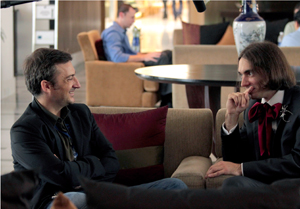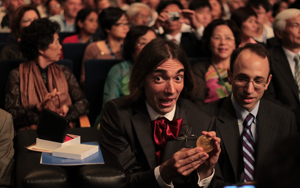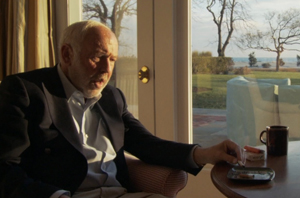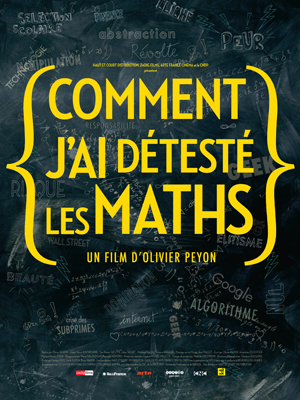Comment J’ai Détesté les Maths-How I Hated Math: Let Me Count The Ways!
- SUBSCRIBE
- ALREADY SUBSCRIBED?
BECOME A BONJOUR PARIS MEMBER
Gain full access to our collection of over 5,000 articles and bring the City of Light into your life. Just 60 USD per year.
Find out why you should become a member here.
Sign in
Fill in your credentials below.
 Comment J’ai Detesté Les Maths (literally How I Hated Math), the amusing new documentary directed by Olivier Peyon comes at a very à propos moment for mathophobes on both sides of the Atlantic: the PISA evaluation of students around the world has shown both the Americans and the French sorely lacking in various subjects, of which math. How I Hated Math explores the hate—but also the love—of math in France, America and other countries.
Comment J’ai Detesté Les Maths (literally How I Hated Math), the amusing new documentary directed by Olivier Peyon comes at a very à propos moment for mathophobes on both sides of the Atlantic: the PISA evaluation of students around the world has shown both the Americans and the French sorely lacking in various subjects, of which math. How I Hated Math explores the hate—but also the love—of math in France, America and other countries.
If there’s a star of the movie it’s Cédric Villani, the French mathematician who won the Fields Medal, the math equivalent of the Nobel Prize. The youthful Villani wears a Buster Brown haircut and old-fashioned cravat, the image of the eccentric prodigy. Bright-eyed and smiling, Villani expresses wonder and enthusiasm about his subject, but also does little to dispel the suspicion that math (at least in its most advanced incarnation) is the private domain of wizards who’ve gone to the numerical equivalent of Hogwarts Academy. We follow Villani to a math convention in Hyderabad in India, where mathematics is a hallowed tradition and Villani is treated like a rock star, then to an institute sheltered in deep forest in Oberwolfach, Germany (which really does conjure up Hogwarts).
 The film also goes to Silicon Valley where we see the geeks Americans are more familiar with. Robert Bryant, chairman of the Mathematical Sciences Research Institute, is crew-cut and straight-laced but just as starry-eyed as Villani about the Pythagorean wonderland of numbers. Eitan Grinspun is just as geeky, but moves the discourse towards technological applications. It’s only a few more steps to techno-oligarchs like Gates, Zuckerberg, and Sergey Brin, but the director cuts to the chase and takes us to New York—to the belly of the financial beast.
The film also goes to Silicon Valley where we see the geeks Americans are more familiar with. Robert Bryant, chairman of the Mathematical Sciences Research Institute, is crew-cut and straight-laced but just as starry-eyed as Villani about the Pythagorean wonderland of numbers. Eitan Grinspun is just as geeky, but moves the discourse towards technological applications. It’s only a few more steps to techno-oligarchs like Gates, Zuckerberg, and Sergey Brin, but the director cuts to the chase and takes us to New York—to the belly of the financial beast.
The genial Lord Voldemort of the documentary is Joe Simons, who used his mathematical acumen to found a super-successful hedge fund based on hyper-complex calculations about momentary blips in the economy, rather than bedrock fundamentals, let alone human concerns. Mr. Simons is honest in a matter-of-fact way that’s more chilling than the Gordon Gekkos of Hollywood. Simon himself was not responsible for the cataclysms that brought down the world’s biggest economy, but he certainly inspired many of those who did: irresponsible bankers, rogue traders and suckers who believed that Oz-like gurus à la Bernie Madoff could do no wrong.
 Peyon gives us the obligatory tour of the financial crash of ’08. This is unfortunate, as it detracts from his real subject to go over ground that’s been gone over more thoroughly by other film-makers. This culminates in an interview with George Papanicolaou, a distinguished professor at Stanford, who delivers a long, anguished I-told-you-so—except he admits that he too was hoodwinked in the early stages of the bubble. Being a native of Greece makes his screed more poignant, though it also brings to mind the Economist Newspaper’s facile but cogent nostrum: if you don’t want to deal with loan sharks, don’t borrow money on the bond market (or from the IMF, for that matter).
Peyon gives us the obligatory tour of the financial crash of ’08. This is unfortunate, as it detracts from his real subject to go over ground that’s been gone over more thoroughly by other film-makers. This culminates in an interview with George Papanicolaou, a distinguished professor at Stanford, who delivers a long, anguished I-told-you-so—except he admits that he too was hoodwinked in the early stages of the bubble. Being a native of Greece makes his screed more poignant, though it also brings to mind the Economist Newspaper’s facile but cogent nostrum: if you don’t want to deal with loan sharks, don’t borrow money on the bond market (or from the IMF, for that matter).
The documentary is on surer ground with older mathematicians like Jean-Pierre Bourguignon and the math historian Jean Dhombres who tell how France’s post-war industrialization resulted in a need for engineers and other technical experts, and hence for advanced mathematics. The new math (or maths modern) was created to ratchet up the expertise of the most talented students. But unfortunately, as in the US, it also resulted in many befuddled teachers and students. The ultimate consequence is that the mathematical elite has reached unimagined new conceptual frontiers, while the rest of us have less of a mathematical base than previous generations. Thank goodness for calculators (and fingers).
 Olivier Payon (who’s directed documentaries about feminist writer Elisabeth Badinter and philosopher Michel Onfray) is an assured filmmaker. Structurally it’s not always clear where he’s going, though we know it when we get there. He keeps the action in How I Hated Math moving at a fast clip and skilfully juggles between cultures.
Olivier Payon (who’s directed documentaries about feminist writer Elisabeth Badinter and philosopher Michel Onfray) is an assured filmmaker. Structurally it’s not always clear where he’s going, though we know it when we get there. He keeps the action in How I Hated Math moving at a fast clip and skilfully juggles between cultures.
Something odd about the film is that while much of it is in English, as the director and Mr. Villani venture into the wide world of the math big leagues, most of those sequences weren’t subtitled. This was a problem for the French public, that will presumably be taken care of (regarding the French-language sequences) if the film gets a wider release. It also brought up the links between language and math. Mathematics itself is a language, as philosophers have stated, and many of our abstract terms come from math. Innumeracy can lead to general ignorance and the equation gets even more garbled when language in the normal sense is also impaired. Something to note when taking in those PISA scores.
Production: Haut et Court
Distribution: Haut et Court
More in film review, French film, How I Hated Math, Paris films




